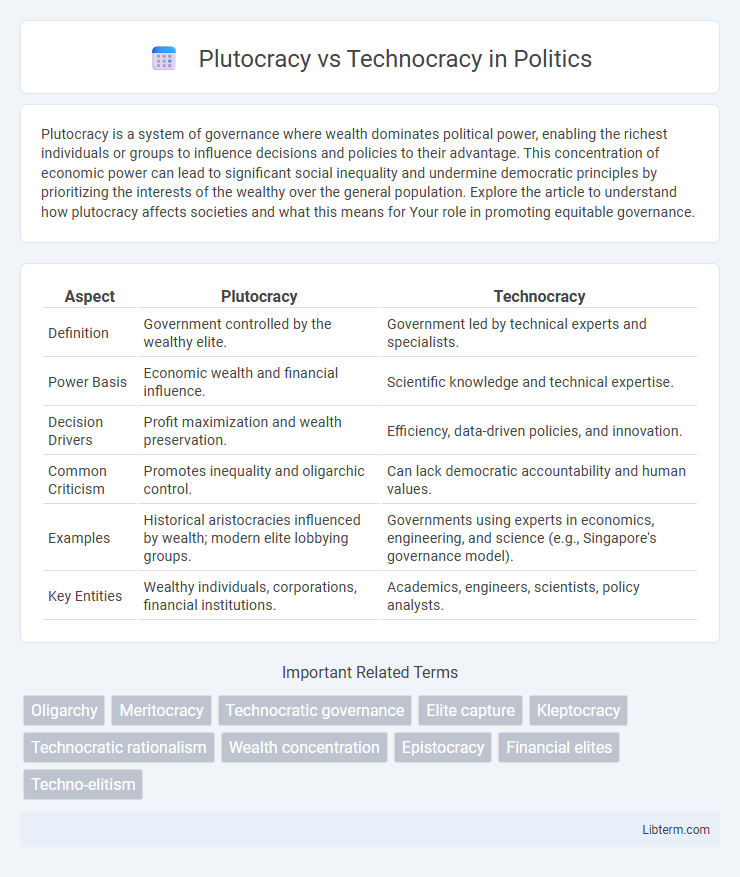Plutocracy is a system of governance where wealth dominates political power, enabling the richest individuals or groups to influence decisions and policies to their advantage. This concentration of economic power can lead to significant social inequality and undermine democratic principles by prioritizing the interests of the wealthy over the general population. Explore the article to understand how plutocracy affects societies and what this means for Your role in promoting equitable governance.
Table of Comparison
| Aspect | Plutocracy | Technocracy |
|---|---|---|
| Definition | Government controlled by the wealthy elite. | Government led by technical experts and specialists. |
| Power Basis | Economic wealth and financial influence. | Scientific knowledge and technical expertise. |
| Decision Drivers | Profit maximization and wealth preservation. | Efficiency, data-driven policies, and innovation. |
| Common Criticism | Promotes inequality and oligarchic control. | Can lack democratic accountability and human values. |
| Examples | Historical aristocracies influenced by wealth; modern elite lobbying groups. | Governments using experts in economics, engineering, and science (e.g., Singapore's governance model). |
| Key Entities | Wealthy individuals, corporations, financial institutions. | Academics, engineers, scientists, policy analysts. |
Understanding Plutocracy: Definition and Key Features
Plutocracy is a political system where power is concentrated in the hands of the wealthy elite, often leading to policies that favor their economic interests. Key features include wealth-based influence, restricted access to political power for lower socioeconomic groups, and a tendency for economic inequality to widen. This concentration of wealth-driven authority contrasts with systems like technocracy, where expertise rather than wealth dictates governance decisions.
Unpacking Technocracy: Principles and Characteristics
Technocracy is a system of governance where decision-making power is vested in experts and specialists based on their technical knowledge and expertise, emphasizing efficiency and evidence-based policies. It prioritizes rational problem-solving and scientific management over political or economic influence, aiming to optimize societal outcomes through data-driven approaches. Key characteristics include meritocratic leadership, reliance on technology and empirical research, and a focus on specialized skills to address complex social and economic issues.
Historical Rise of Plutocratic Systems
Plutocratic systems historically emerged during periods of economic concentration where wealth accumulation enabled elite classes to exert significant political influence, such as in Ancient Rome and Renaissance Italy. The rise of merchant oligarchies and banking families like the Medici showcased how financial power translated into control over governance structures. This concentration of wealth-led political dominance set the stage for modern plutocracies, contrasting with technocratic models that prioritize expertise and technical governance over economic status.
Technocracy in Practice: Past and Present Examples
Technocracy in practice can be observed in historical instances such as the Soviet Union's emphasis on scientific management and China's recent integration of expert technocrats in government roles. Modern examples include Singapore, where highly educated professionals implement data-driven policies to promote economic growth and public efficiency. These cases demonstrate technocracy's focus on governance by specialists with technical expertise rather than wealth or political power.
Distribution of Power: Wealth vs. Expertise
Plutocracy centralizes power in the hands of the wealthy elite, where financial resources influence political decisions and societal control. Technocracy allocates power based on specialized knowledge and technical expertise, emphasizing data-driven and efficient governance. The distinction hinges on wealth as a source of authority in plutocracies versus expertise and merit in technocratic systems.
Societal Impacts: Economic Inequality and Innovation
Plutocracy often exacerbates economic inequality by concentrating wealth and political power in the hands of a few, limiting social mobility and access to resources for the broader population. Technocracy promotes innovation by prioritizing expertise and data-driven decision-making, potentially fostering economic growth through advanced technology and efficient resource management. However, technocratic governance may risk overlooking social equity if innovation benefits are unevenly distributed across society.
Governance Models: Decision-Making in Plutocracy and Technocracy
Plutocracy centralizes decision-making in the hands of the wealthy elite, where financial power dictates political influence and policy outcomes, often prioritizing economic interests. Technocracy transfers governance authority to experts and specialists who base decisions on technical knowledge, data, and evidence, aiming for efficiency and rational problem-solving. The contrasting models highlight governance driven either by economic capital accumulation or scientific expertise, shaping policy priorities and administrative strategies.
Democracy at Risk: Plutocratic and Technocratic Challenges
Democracy faces significant risks from plutocratic influence where wealth concentrates power, undermining equal political participation and policymaking fairness. Similarly, technocratic dominance can marginalize public opinion by prioritizing expert rule over democratic deliberation, potentially reducing transparency and accountability. Both plutocracy and technocracy challenge democratic ideals by shifting power away from the electorate toward elites, threatening inclusive governance and social equity.
Ethical Considerations: Justice, Merit, and Representation
Plutocracy prioritizes wealth as the basis of power, often resulting in limited justice and unequal representation due to the concentration of influence among the wealthy elite. Technocracy emphasizes expertise and meritocracy, promoting decisions based on knowledge and competence but potentially marginalizing democratic representation and diverse societal values. Ethical considerations in both systems revolve around balancing fair representation, equitable justice, and merit-based leadership to ensure inclusive governance.
Future Prospects: Navigating Toward Balanced Governance
Future prospects in governance suggest a shift toward models integrating both plutocracy and technocracy to harness economic power and expert knowledge effectively. Balancing wealthy influence with technical expertise could foster more equitable and efficient policy-making driven by data and innovation. Emerging technologies and transparent systems may enable this hybrid governance to mitigate risks of inequality and technocratic elitism while promoting sustainable development.
Plutocracy Infographic

 libterm.com
libterm.com